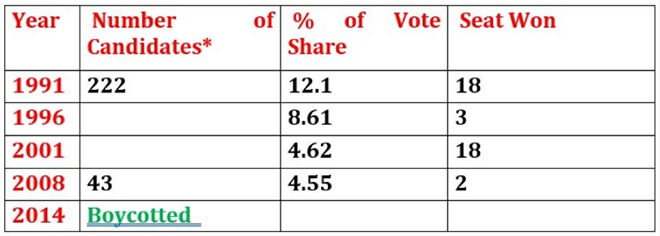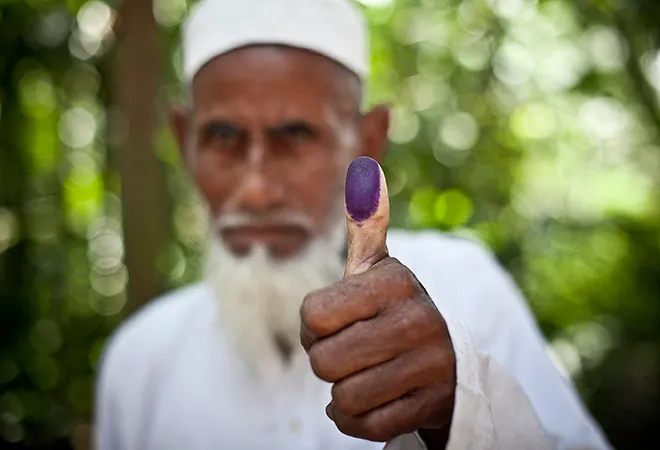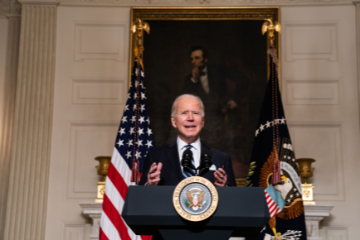The religion-based political parties have attained substantial attention in the run-up to the 11th parliamentary elections in Bangladesh, scheduled for 30 December 2018. The religious political parties are expected to play a key role in influencing the outcome of the elections.
10 Out of 70 Religious Political Parties Registered With EC
Presumably, Jamaat-e-Islami, the most influential of them, will be the leader of the religious right-wing parties as it has been a key ally of the Bangladesh Nationalist Party (BNP), the centre-right party arch rival of the ruling Awami League.
In the present context, the Awami League, a chief advocate of secularism in Bangladesh, forged alliances with the religious right wing, a move primarily driven to secure a vote share in the elections.
Given the importance of the religion-based parties, the assumption is that the upcoming elections will add a new dimension to Bangladesh’s politics.
There are around 70 religion-based political parties in Bangladesh. Of the 70, 63 are claimed to support Awami League and 5 to its opposition BNP.
Interestingly, only 10 of these parties are registered with the Election Commission.
Thus, 10 of these religion-based parties are eligible to contest elections with their own party symbol and name.
Vote-Share of Religion-Based Parties Not Too Significant
Till date, the religion-based political parties could not secure any major position of influence in the political system of Bangladesh with the exception of Jamaat-e-Islami. The party was a prominent alliance partner of the BNP government (2001-06) and had ministers in the cabinet.
It’s worthy to note that Jamaat’s registration has been cancelled by court order on charges of non-conformity to the party’s charter with that of the constitution of Bangladesh.
In the upcoming elections, Jamaat has filed 25 candidates as part of the BNP-led Jatiya Oikyo Jote 20 party alliance and the party will not be able to use its party symbol in the upcoming elections.
Traditionally, the vote share of the religion-based political parties have not been significant.
Jamaat, the biggest of them, had secured 12 percent of the vote in 1991 and had won only 18 seats out of the 222 constituencies the party had filled candidates, and this remains the best performance in the party’s entire electoral history. The table below gives the gist of the Jamaat’s electora
l performance after democracy was reintroduced in Bangladesh in 1991.
 Source: * ‘Jamaat Planning to contest poll as part of alliance’, ‘The Dhaka Tribune’, 13 August 2018; Bangladesh: Political Trend and Key Players, Strategic Trends, ORF, Volume 1 Issue 2, November 2011
Source: * ‘Jamaat Planning to contest poll as part of alliance’, ‘The Dhaka Tribune’, 13 August 2018; Bangladesh: Political Trend and Key Players, Strategic Trends, ORF, Volume 1 Issue 2, November 2011
Electoral Arithmetic
Electoral arithmetic is a key consideration for the mainstream political parties’ hobnobbing with the region-based parties. Electoral trends in Bangladesh suggest that slight difference in the percentage of vote by the political parties significantly influences in the actual number of seats won. For example, in the 1991 elections, Awami League had secured 30.1 percent while BNP secured 30.8 percent, but BNP won 144 seats, and Awami League could win only 88 seats.
Again, since many of these religion-based political parties are linked to shrines/mazhars they have a large following, and mainstream parties are also looking to target the large follower base.
A prominent development has been Hefazat-e-Islam’s support to Awami League. Hefazat is a ‘non-political’ party based in the port city of Chittagong and runs hundreds of Qawmi madrasas. Hefazat-e-Islam made headlines following a rally in 2013 that led to the blockade of the capital Dhaka.
Initially, the government had resisted the Hefazat-e-Islam, but its relationship with Awami League transformed. In November this year, Hefazat-e-Islam held a massive rally in Dhaka where Prime Minister Sheikh Hasina was honoured with the title “Mother of Qawmi” for recognising the Dawra-e-Hadith degree of Qawami Madrasa as the equivalent of a master’s degree in Islamic studies and Arabic.
What Next?
The Awami League’s closeness to Hefazat-e-Islam resulted in scepticism amongst many of the observers of Bangladesh’s society and politics, and the fear is that this might disturb the liberal socio-polity of the country.
Some observers of politics in the country, however, opined that Hefazat-e-Islam’s support to the Awami League could affect the voting pattern of the madrassa-educated, as their numbers are in hundreds and thousands.
The results of the upcoming elections will suggest the future of Bangladesh politics and the amount of influence they assert on the people of the country.
This commentary originally appeared in The Quint.
The views expressed above belong to the author(s). ORF research and analyses now available on Telegram! Click here to access our curated content — blogs, longforms and interviews.




 Source: * ‘Jamaat Planning to contest poll as part of alliance’, ‘The Dhaka Tribune’, 13 August 2018; Bangladesh: Political Trend and Key Players, Strategic Trends, ORF, Volume 1 Issue 2, November 2011
Source: * ‘Jamaat Planning to contest poll as part of alliance’, ‘The Dhaka Tribune’, 13 August 2018; Bangladesh: Political Trend and Key Players, Strategic Trends, ORF, Volume 1 Issue 2, November 2011 PREV
PREV


